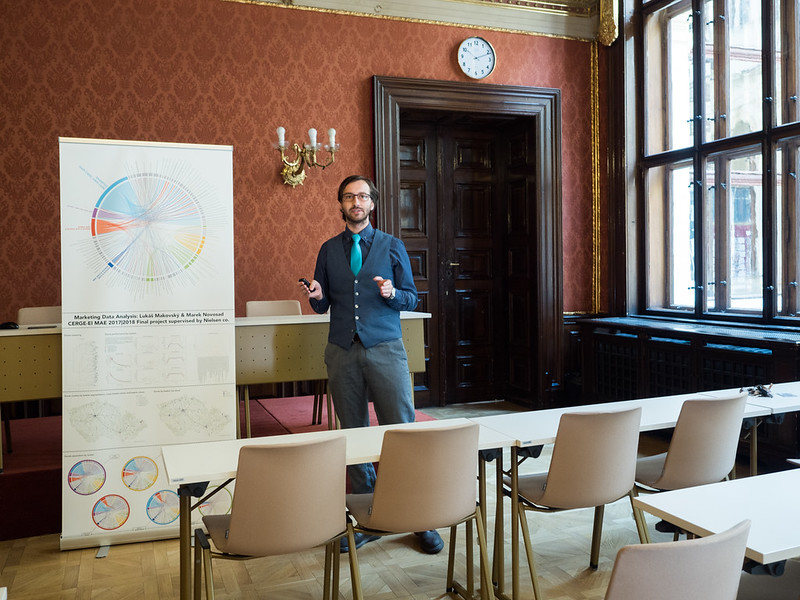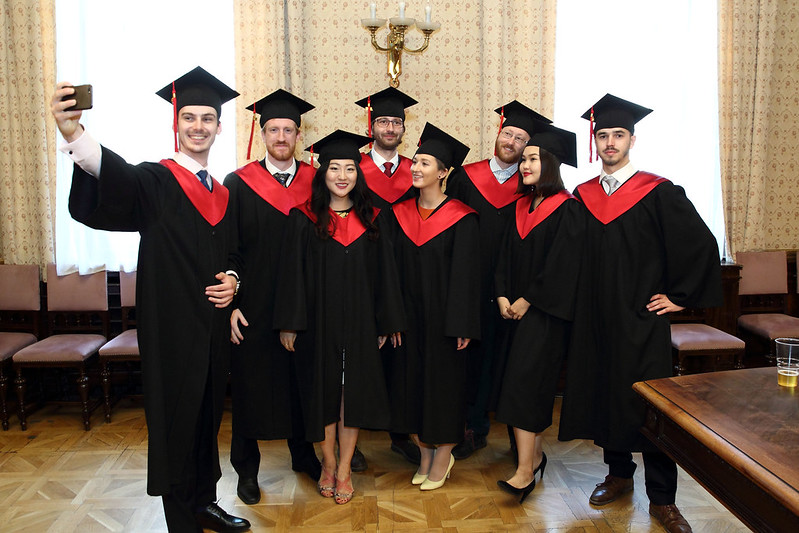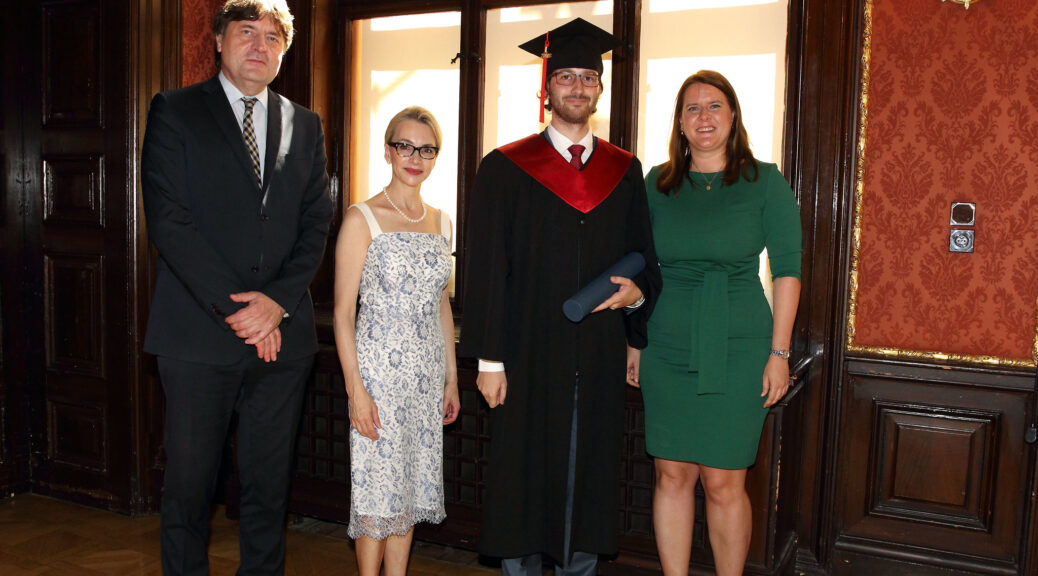What makes one enroll in the Master in Applied Economics program when he/she already has a promising career in architecture and urbanism? Read an interview with Lukáš Makovský, our MAE graduate from 2018, who we sat down with to discuss professional life choices, his studies at CERGE-EI, working in Prague, and doing research in London at once, and a bit more.
After graduating from architecture, you worked for a short time as an architect, later joining the Prague Institute of Planning and Development for three years, two of which were spent as head of the Strategy and Development office. While working at the IPR, you enrolled in the MAE program here at CERGE-EI. Didn’t the studies of architecture meet your expectations?
Only after I had studied at different universities, CERGE-EI being one of them, did I come to the realization of how much the school system I had been involved in before lacked.
For instance, CERGE-EI offers individual consultations with professional coaches and advisors for further study and career steps to their students. It can absolutely change the view of what one wants out of his or her professional life. Back then, I was planning to stay at the Prague Institute of Planning and Development. The consultations gave me the confidence to apply to a PhD program abroad; they showed me that despite my professional experience as an architect and urbanist, this could be a more suitable path for me.
Back at the faculty of architecture we had hundreds of consultations on where to put which brick and where to install a chimney the best, but we never had a meeting with a professional career coach that would suggest following a certain path based on our talents. I can’t even remember that the faculty would inquire about our following career steps after graduation. On the other hand, the Master in Applied Economics program actively monitors the profiles of their graduates on LinkedIn.
“Back at the faculty of architecture we never had a meeting with a professional career coach that would suggest following a certain path based on our talents.”
I assume you wanted to expand your knowledge beyond architecture when you decided for the MAE program at CERGE-EI. What was your main motivation to study again and how did you learn about the MAE program?
When I started working at the Prague Institute of Planning and Development, I quickly realised I lacked some background in economics. We were often tasked, for instance, with evaluating the development potential of prospective developable sites or comparing the wider effects of various forms of urban development, e.g., what the costs and benefits are if a given built volume is to be located within the wider city centre or in more remote suburban areas. To navigate myself in this field I read various theoretical and empirical articles in urban economics and at that point it become clear that I needed to first learn the fundamentals of economics and econometrics to be able to get a better insight into urban economics.
“When I started working at the Prague Institute of Planning and Development, I quickly realised I lacked some background in economics.”

CERGE-EI and the MAE program were not unfamiliar to me. I had already considered applying for the PhD program before, in 2014. I googled if there was any school in the Czech Republic offering courses in urban economics and at that time CERGE-EI had it listed among the elective classes so I attended CERGE-EI’s open doors event and later submitted my application to the PhD program, but I was not accepted. Although I considered it a failure at that time, I have to admit I definitely was not prepared for that program back then. A few years later I participated in a CERGE-EI students’ data analytical weekend workshop, as the Prague Institute of Planning and Development provided some spatial data to the students and my role was to help the students with those data if they needed it. It is hard to describe it, but there was a unique atmosphere and enthusiasm among all the participants that made me think again “Wow, it would be great to study here,” so I applied for the MAE program as it was feasible to combine it with my regular employment.
So, what was it that you discovered about yourself anew when on the MAE program?
First of all, how much mathematics I had forgotten since the end of high school and the beginning of my university studies. So initially I needed to refresh it a little bit.
I might not call it a striking new discovery, but I like it when I can organize my own understanding of things in a clear framework. I was always inclined to think in abstract terms about the underlying forces that shape cities, if I related it to urbanism, and I really enjoyed learning about micro and macro models as I was immediately thinking about their applicability in urban affairs and many of them brought me this organized framework of understanding. It was like putting jigsaw puzzle pieces in the right place.

You were subsequently accepted to a PhD program at the London University of Economics and Political Science to study economic geography. Your research focuses on urban spatial amenities’ value and their complementarity with other spatially determined factors. Can you go into more detail about your research?
My aim was to orient on a research field where I can best utilize my previous education and experience as an urban planner. For that reason, my first project addresses urban amenities, urban green spaces in particular, as their design and especially decision about their size is an important part of urban planning. Broadly, I analyse how various features of green spaces, such as their size, proximity to residents or quality, affect their value to evaluate their efficient provision given the opportunity cost of land.
In my first paper, focusing on Prague, I’m using the hedonic pricing model to infer what is the negative effect of noise on green areas and my initial findings show that green areas with the lowest noise pollution are valued roughly two times higher compared to ones with median noise pollution and the noisiest green areas do not have any value at all.
After leaving the IPR, you started working in Real Estate Advisory at Deloitte Czech Republic, where you focus on data analytics and econometrics, and are particularly involved in projects for the public sector, such as national ministries and municipal governments. What is it that you are working on right now (if you can talk about it) and how do you juggle your work, studies and private life?
Working for Deloitte is an amazing experience. Not only because the working environment is nice, but also due to the approach to the projects we work on – starting with data analytics, modelling and then forming quantitative results into recommendations. Moreover, the range of clients we work for – from municipalities and ministries to various private companies – makes the projects very diverse and always intellectually challenging.
I can mention for instance a project we have been working on since the beginning of this year. It is a proposal for the reform of the Czech Building Act in the area of spatial planning jointly commissioned by the European Commission and the Czech Ministry of Regional Development. It is a very complex task that we are collaborating on with our Deloitte Legal team and it comprises of a detailed quantitative analysis of the spatial development trends in the Czech Republic, analysis of the planning objectives and current law as well as of an assessment of stakeholders’ views and review of international best practice. It is a kind of project I feel I have been preparing for over the course of my past studies and work experience, as I utilize in it the skills in urban planning, economics, econometrics, programming and even project management.
I suppose it is not surprising that it is not always easy to manage some balance between school activities, work and family. It is especially challenging now that I’m in London and my wife and son are in Prague and we cannot see each other regularly during the semester due to the travel restrictions and quarantine requirements. On the other hand, when I’m in London I can devote all my time to my research and work and when the semester is over, I have holidays with my family.
Thank you for your time, Lukáš. Last but not least, is there anything you would like to share with our blog’s readers?
I would say do not give up. Also, it is never too late to start doing something that you believe makes sense.

Great interview. I will be forwarding it to one of my friends who is a young architect whose work touches on areas similar to Lukáš.